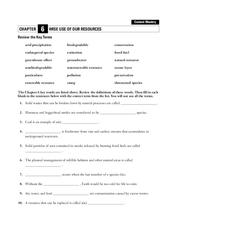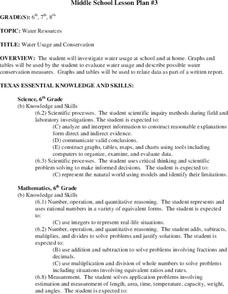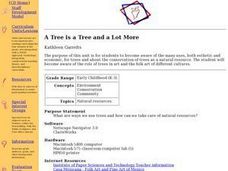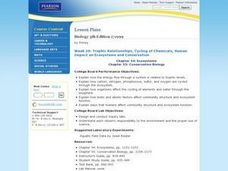Curated OER
Natural Resources
In this natural resources worksheet, students will brainstorm natural resources, how people change the Earth, and how people can save the natural resources. This worksheet is a graphic organizer.
Curated OER
How Can People Save Resources?
In this resources worksheet, students will review how people can save resources by reducing, reusing, and recycling. Students will fill in the blank of 4 statements in this graphic organizer.
Curated OER
Wise Use of Our Resources
In this resource review worksheet, learners will review the definition of key vocabulary words and then fill in the blank with the correct term in 10 sentences.
Curated OER
Waterdrops: Water Conservation
In this water conservation worksheet, students figure the amount of water saved from various water consumption practices. Students make a plan to save water at home and track their results. Students create a radio announcement to get...
Curated OER
Water Conservation
In this environment learning exercise, students look for the facts of how to conserve water and help the environment. They complete the activities as part of the unit.
Curated OER
Eco-Warrior
Students recognize that a man's actions in changing his environment can have drastic results for their world. They discuss the use of energy conservation and the use of recycling materials to improve our environment.
Curated OER
Corrosion/Conservation/Preservation
Students examine the reasons why metal corrodes in regard to metal artifacts. In groups, they discover the affects of salt water on metal and compare the type of corrosion found on iron. They also research the types of metal...
Curated OER
What Is Sustainability?
Students discuss environmental preservation and sustainability and their role in consumption and preservation. After a brief demonstration of how limited our resources are, students determine which natural resources they use most...
Curated OER
Sustainable Dining
Students evaluate the how their product choices impact the environment. They discuss the concept of sustainability in agriculture. Students give reasons for buying sustainable food products. A cost-benefit analysis concerning sustainable...
Curated OER
The Conservation Clubhouse
High schoolers design a clubhouse. After investigating forms and sources of energy, students investigate the advantages and disadvantages of each. They consider energy use, conservation and the effects of energy shortages. Finally, high...
Curated OER
Water Under the Bridge
Students consider how much water they use on daily basis by investigating and recording their own patterns of water use over two weeks, and discover ways to begin conserving water in their own homes. Culminating field trip to local creek...
Curated OER
Water Usage and Conservation
Pupils investigate water usage at school and at home. They use graphs and tables to evaluate water usage. Students describe possible water conservation measures. They use graphs and tables to relate data as part of a written report.
Curated OER
Renewable vs. Non-Renewable Resources
Fifth graders, after brainstorming why conservation of resources is important, distinguish between renewable and non-renewable resources. They make a list of different types of natural resources on the board and then sort them into two...
Curated OER
What Can You Do?
Learners explore reasons for the destruction of the wetlands and identify ways people can help protect them. They create and design a wetlands conservation poster to be presented to the class.
Curated OER
Career and Personal Planning
High schoolers visit Conservation in Action web site to watch three video interviews with Vancouver Aquarium researchers, complete Careers in Conservation worksheet, research threats facing species featured on Conservation web site, and...
Curated OER
Recycling
Students investigate how to reduce, recycle, and reuse items in order to conserve natural resources. They complete a trash graphing activity after discussing different types of trash. Finally, the examine ways to buy recycled products to...
Curated OER
What If We Run Out?
Students explore the consequences of shrinking habitats and the human impact on wildlife populations. They participate in a game to study the consequences and describe the preservation of animal habitats.
Curated OER
Conservation Connection
Students work in groups to create a script for a one minute commercial on how to conserve our reusable energy sources. When the scripts are written, explain to the students that a story board is similar to a cartoon.
Curated OER
The Great Kapok Tree
Students read The Great Kapok Tree by Lynne Cherry. After reading the story, they center on the controversy of destroying the rain forest or conserving it. Students have to make an informed decision about rain forest destruction.
Curated OER
The Energy Task Force
Students simulate a meeting of the President's energy task force in order to observe how energy policy may be developed with the input of various groups. Students will form groups with the following roles: lobbyists, members of the...
Curated OER
Wetlands: Pave or Save?
Students discuss the characteristics of wetlands and how to make them more productive. Using a map, they locate the major wetlands in the United States and color them using a key. They read an article and in groups answer discussion...
Curated OER
A Tree is a Tree and a Lot More
Students listen as the teacher reads "The Giving Tree." they discuss all the things the tree gave the boy throughout his life. They discuss ways they benefit from trees. This studying culminates with a tree walk and planting a tree in a...
Curated OER
Trophic Relationships, Cycling of Chemicals, Human Impact on Ecosystems and Conservation
Learners explore how the energy flow through a system is related to trophic levels. They investigate how organisms affect the cycling of elements and water through the biosphere. Students participate in lab activities to observe ways...
Curated OER
Watch Your Water Use
Students record their freshwater usage over a period of a week. They calculate the amount of water used for all water activities such as brushing teeth, flushing the toilet, showering, and washing the dishes. They use an online tally to...

























